Previously on Drokk!: While I usually use this space to talk about where we are in terms of the larger Judge Dredd mythology, there’s only one way to properly discuss what’s come before this episode: I have talked up the Judge Dredd/Aliens: Incubus crossover for a lot of episodes, and now it’s finally here. Get ready.
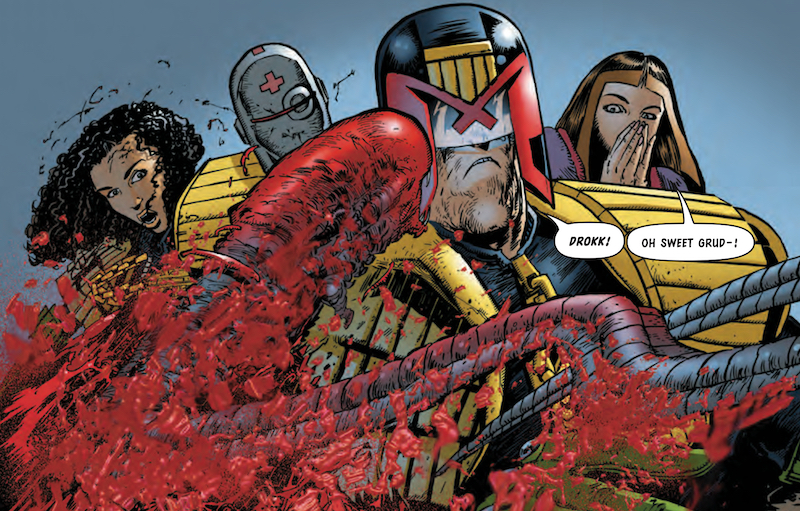
0:00:00-0:02:37: Welcome, dear friends, to the podcast that is closer to the end than you might think. (Wait until the end of the episode for more information on that.) This time around, we’re reading Judge Dredd: The Complete Case Files Vol. 36, collecting material from 2000 AD and The Judge Dredd Megazine from late 2002 and early 2003; we speed through the introduction before I mention Siku, which quickly leads us to…
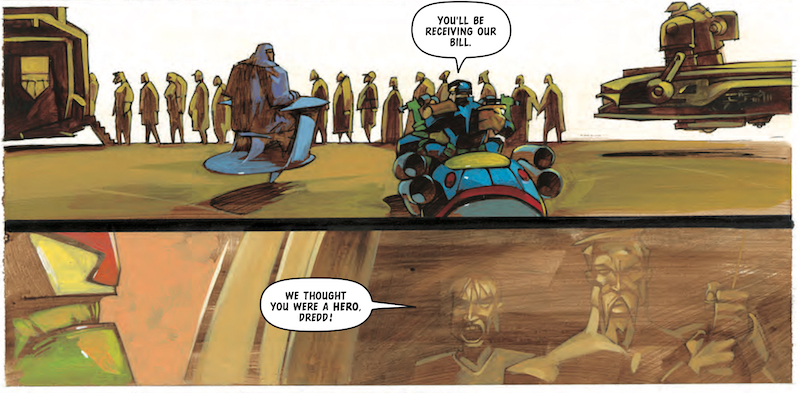
0:02:38-0:18:11: For once, we start with a discussion about the visuals of Dredd in this era, starting with a brief discussion about the many weaknesses (and, thankfully, some strengths) of Siku, a much-derided artist in earlier episodes who returns for a one-off in this volume. More derision is delivered on this go-around to Ian Gibson, an artist previously lauded by Jeff, who might just be out of sync with what we’re looking for my this point, as well as the solid-but-uninteresting Paul Marshall; we also talk about color choices in this volume — and, indirectly, media choices, in terms of computer coloring versus paints — but perhaps the most important thing mentioned in this section is this: Mick McMahon’s Dredd now has lips.
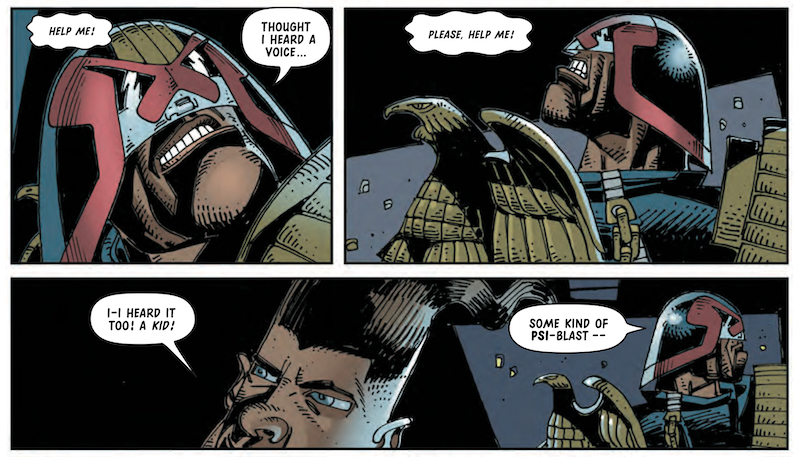
0:18:12-0:31:02: Moving swiftly on, Jeff and I enjoyed a particularly rare moment of the two of us independently having the same reaction to something in a Case Files; namely — Gordon Rennie has, seemingly without notice, turned into quite an impressive understudy for John Wagner. Both of us read some of his contributions to this volume — most notably, “After Hours,” although Jeff’s also a fan of his “Give Me Liberty” — and thought it was actually Wagner’s work, albeit “John Wagner on a bad day”… something that we genuinely both mean as a compliment, as we try to unpack here. What makes Rennie’s Dredd suddenly feel so authentic? What does writing a good Wagner Dredd mean? We try to answer both questions, and arguably succeed to some extent.
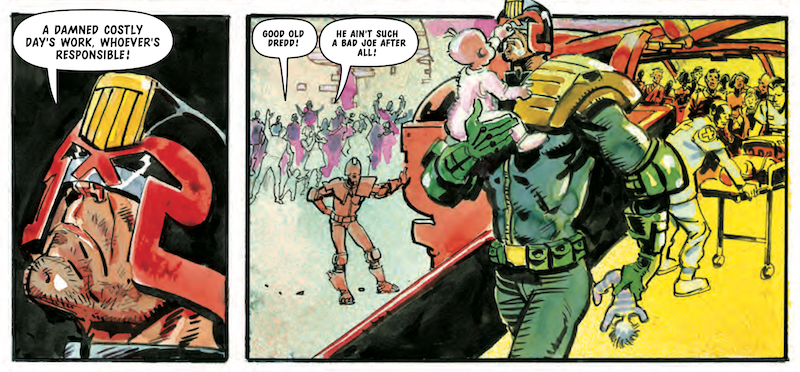
0:31:03-0:47:10: What starts as a brief discussion about Jim Baikie’s art in this volume quickly becomes a potted history of Baikie’s career, and then, on an entirely different note, both of us expressing our disappointment in “Rotten Manners,” the final installment in the “Bad Manners” trilogy about a corrupt Judge that, impressively, manages to do almost everything wrong that the first story did right: it’s too broad, too clean, and far too confident that the system will succeed. It would leave a particularly unpleasant taste in our collective mouth, if it wasn’t for…
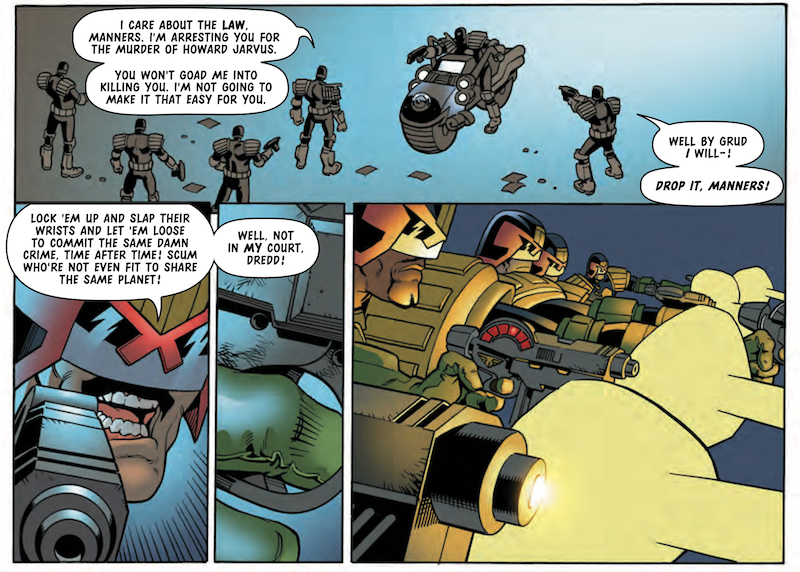
0:47:11-1:19:37: Perhaps surprisingly — well, I was surprised, at least — Jeff turns out to have dug Incubus, the Dredd/Aliens crossover, as much as I hoped he would, with a couple of caveats relating to his overall suspicion of the Alien franchise and narrative problems therein. Nonetheless, this isn’t just a great Alien(s) comic, it’s a great Dredd story too, and we talk about why that’s the case, the things that make the story work so well as both, and the ways in which the two different properties provide something that fits so well with the other. Also! We sing Henry Flint’s praises a lot, and still it’s arguably not enough. Really, this is just great comics right here. (And Jeff brings up the videogame BroForce, because of course he does.)
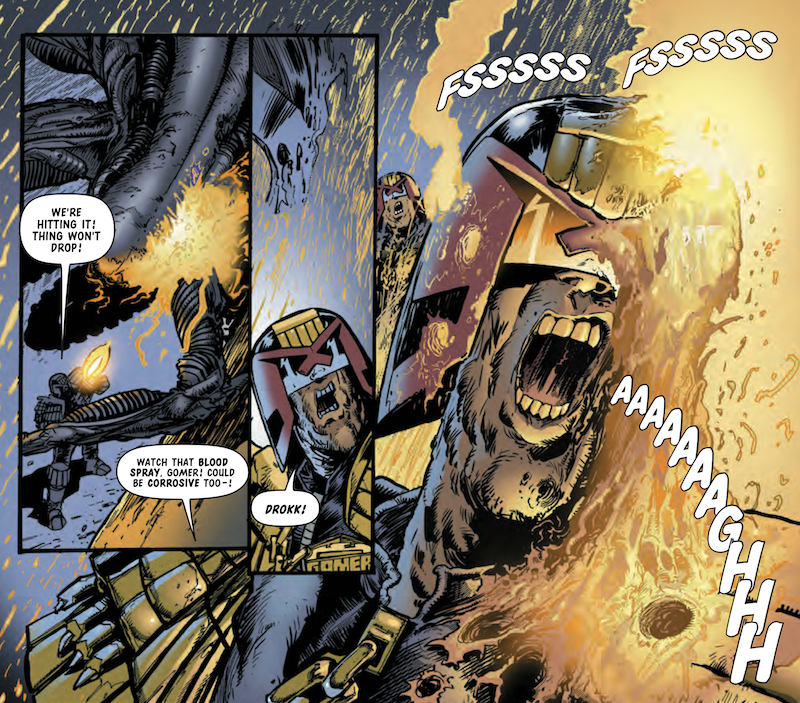
1:19:38-1:27:37: It sounds as if we’re about to wrap things up by mentioning whether the volume is Drokk or Dross, but no! Instead, we have a diversion about “Out of the Undercity,” another story in the book that tenuously connects to Incubus, and then we talk some more about the Judge Death connections and references to the Aliens franchise in general. What else do you expect, if not our getting in our own ways as we’re talking?
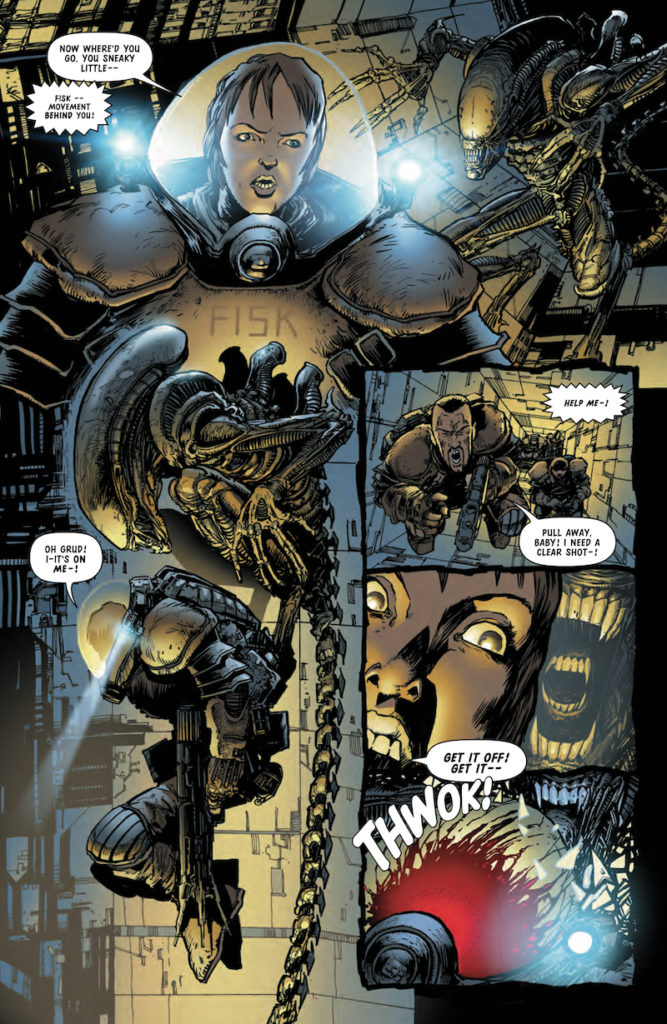
1:27:38-end: Now, we finally get to wrapping things up by talking about our favorite stories that aren’t an Aliens crossover in the volume — “Zoom Time” being mine, and “Give Me Liberty” being Jeff’s — as well as the overall leap in quality of this volume, and briefly looking ahead to what’s coming up before mentioning the Twitter and Patreon, and enjoying Jeff’s ever-evolving voice of Dredd outro. One thing we didn’t talk about but should have: we’ll be back in two weeks for a new Wait, What?, so enjoy next week off, Whatnauts.


It’s late, I know — sorry! But here’s the direct link for those who like direct links: https://theworkingdraft.com/media/Drokk/DrokkEp40.mp3
It’s nice to hear you two agreeing so much! I find myself very much in agreement as well. Incubus is a great Aliens comic, a great Dredd comic and a great comic. Everything you said about Flint’s art, I agree with. This is a step up by an already formidable artist. He has successfully internalised aspects of classic Dredd and 2000ad artists, such as Ezquerra, McMahon and O’Neill, but he doesn’t come across as a cover band. He draws a Mega-City One that is both big and constantly claustrophobic. You refer to the horrific violence in this story. I think that’s part of Flint’s engagement with early 2000ad. In my recollection, when 2000ad began it had many more of these panels showing horrible things happening to bodies. There’s so much good art in the story, but I’m surprised by the panel I keep going back to. It’s early on, outside the hospital. Dredd, Giant and a forensic officer (Judge Forensic? ) talk in the foreground, while a corpse is being removed in the background and the Verminators arrive. It’s a third of a page and it seems I love it in particular.
There’s one thing in the story that didn’t work for me. My working theory is it’s a joke I didn’t get. It’s Dredd monologuing his actions while fighting the Alien on top of the train. Things like ‘Gotta…hang on…’ and ‘Pipe’s giving away-!’ would just be bad in the vast majority of comics, but I’d rather think it’s me, than this comic.
I know we are getting close to the end of the case files, but I really am hoping you skip Drokk! for a month in August and do a special Baxter Building for the 20th anniversary of Waid and Ringo’s Fantastic Four.
You can consider it a thank you for giving to your Patreon for I think 8 years now. :)
(You by no means owe me for supporting you guys. I support the fine work you guys put out on a regular basis. Unless it was working, you better believe you waffle-eating bastards should do it!)
Thanks for both the suggestion and the letting-us-off-the-hook of the suggestion, Patrick! I’ll definitely talk about it with Graeme since that’s such a career-defining run of FF….and I think we may or may not have some wiggle room with our pqcing of the Drokks!
(man, I need a waffle, by the way—I haven’t been to the Waffle Window since before the pandemic and my body *mourns* for it!)
Jeff is a Waffle Widow.
Scattered thoughts:-
– I thought Incubus was a good Aliens story, but no more than an OK Dredd story. Which may say something about where Dredd stories rank versus Aliens stories, for me. But for me, it’s not much more than alright. It does what it does well, but what it does is mostly what you’d expect? Which is fine — the point about This Property Meets That Property is precisely to give you the usual things about each, juxtaposed. But it puts a ceiling on how good such a story can be. I do appreciate that the art is great, though.
– I was a bit surprised that our hosts didn’t say more about Case for the Defence. In fact, I’m not sure that they even mentioned it. From the perspective of The Ongoing John Wagner Long Game Dredd Saga, I think it’s easily the most significant story in the volume.. Because *this* is where the Apocalypse War gets redefined.
(At least in Dredd stories. I haven’t read all the Anderson stories where she had her affair with Orlok and so on. So perhaps some of this was in there.)
Recap: there is *very* little reason in the text to read Dredd’s nuking of East-Meg One at the end of the Apocalypse War as something that was presented as morally questionable in its original appearance. The Sovs start the war and they do so without any provocation, solely because (as far as The Apocalypse War presents it), they have developed a defence that means that they can win a nuclear war. They use nuclear weapons first, killing 400 million people. The only reason why they don’t destroy all of Mega-City One is that they are going to invade and conquer the rest. And they are on the verge of final victory when Dredd and his team carry out their desperate one-last-chance mission.
So how does Case for the Defence redefine that? By going back to the “without provocation” bit and retconning it: Mega-City One had plans to attack East-Meg One, and Orlok sincerely believed that he was engaged in a pre-emptive strike in response to an imminent attack. It’s explicit in the story that Orlon’s defence *is* Dredd’s defence, and vice versa — each believed that they were doing what “had to be done” against an enemy bent on utterly destroying them.
Now this is all very Cold War, as admittedly one might expect, and I suspect it was informed by how very close the US and USSR came to nuclear war on more than one occasion because of what they thought the other might be about to do.
This is curious, because that Cold War framing was ancient history at this point. There was, rather obviously, in 2002 a much more pressing topic that one could have addressed when dealing with the whole issue of countries ginning up support for attacking other countries out of a desire for revenge. Perhaps the follow-up stories that I assume are coming will do better here, but I think Wagner missed a chance here to write a version of this with more resonance for his current moment.
– Our hosts said how much they were starting to like Gordon Rennie. This reveals their hidden right-wing agenda.
No, not really. I have no idea what Rennie’s actual politics are (and to the extent that he’s offered a clue, well, I think he might not think so well of the Royal Family). It’s perfectly possible that what are starting to look like characteristic features of how he writes Dredd are simply the result of someone asking the basic question, “How does a Dredd story work?” and Rennie was not really thinking much about the politics.
But not to go all Nate A. on intentionalism, Rennie does seem to end up in some quite right-wing places, whatever his personal beliefs. He seems to like that framing for Dredd stories in which the judges are reasonable and sane, and the citizens need to be controlled for their own good, because people are idiots. That’s here in the secession story, and in the simp story, but we’ve seen it before from Rennie.
And then we have “Open Justice,” which is an *extremely* right-wing story with an immediately recognizable conservative law-and-order trope, that the police are to be trusted and any complaints about police brutality are just vicious criminals exploiting stupid bleeding-heart liberals.
Not the first time Rennie has gone for an easily-recognizable conservative trope: consider the way a story in a previous volume attacked revisionist historians who tell you that the past didn’t happen the way you know it did. There’s something similar in the simp story here, with its traditional conservative hostility to “useless” social-science intellectualism.
Alright one might say, there’s “After Hours,” where it’s a good thing that Dredd can let a citizen off. But notice to *whom* the different rules apply, a war veteran. There’s nothing in that story that would bother the Daily Telegraph.
Of course, a lot of this is in Wagner, too, from time to time. But I would say that while our hosts are right that Rennie is learning to channel Wagner, I’m not sure that he’s channelling *all* of Wagner.
– Our hosts are completely right about the Manners story. To the point that I actually checked that this was John Wagner writing it. It’s a shame, because there were hints early on of something better, with an interesting look at Manners’s psychology. His absence of reverence for Dredd was also worth noting, as was “We *make* the rules.” That raises the problem with one of the basic conceits of Dredd stories: where does the law come *from*? These hints of something better make it especially disappointing that what this ends up as is a straightforward “bad apple” story story about a bad cop.
The two of you delivered a great episode! I knew “Incubus” would be good, because I ready around the time the show was doing the Ennis-led Case Files. I needed a palette cleanser, and I heard that story was good. I think it was around the time Dark Horse lost the Aliens license, so I was worried I would never be able to read it, so I bought the book collecting the Alien and Predator stories. I think I mentioned this in my comment on Morrison’s Dredd work, but the reason I was so excited for that “Day of Judgment” story, if that was the name, was because it started out very much in a similar vein to “Incubus.” Man, was I disappointed, but I think we all were.
As someone who read a number of the Dark Horse Aliens comics in the ’90s, I can say there were definitely diminishing returns, and, like the new Marvel series, I think the issues is they cared too much about the lore of the Aliens’ world, whereas “Incubus” focused on what makes the Aliens such a great filmi monster. “Incubus” wasn’t shy about keeping some tropes from the films, but I think it did a great job of not relying on them. Almost all the other comics, and even the movie sequels, focus too much on the androids or the colonial marines to the exclusion of telling a good story with the Aliens.
I was skeptical the first time I read it how it would pan out, because, as you mentioned, the judges have encountered alien creatures before, even in riffs on the xenomorphs themselves. Heck, Dredd even fought an extra terrestrial that was basically Dracula. I think that was one of the many failings of the Predator story–it just felt like another day in the life of Mega-City One. “Incubus,” however, felt like something with stakes. I think the end result is something that’s satisfying to fans of both Aliens and Judge Dredd.
I’m glad our hosts are coming around to Gordon Rennie. From his first few Dredd stories, I felt he was the closest to Wagner’s inheritor we’ve seen yet. If his work felt lacking, it wasn’t because he’s Wagner on an off day; I think it’s because he’s channeling early Wagner. We’ve been blessed to see Wagner’s writing, world view, and politics evolve over 25 years. Rennie feels like he’s doing Wagner somewhere between years 4 and 6. Very curious to see how he develops!